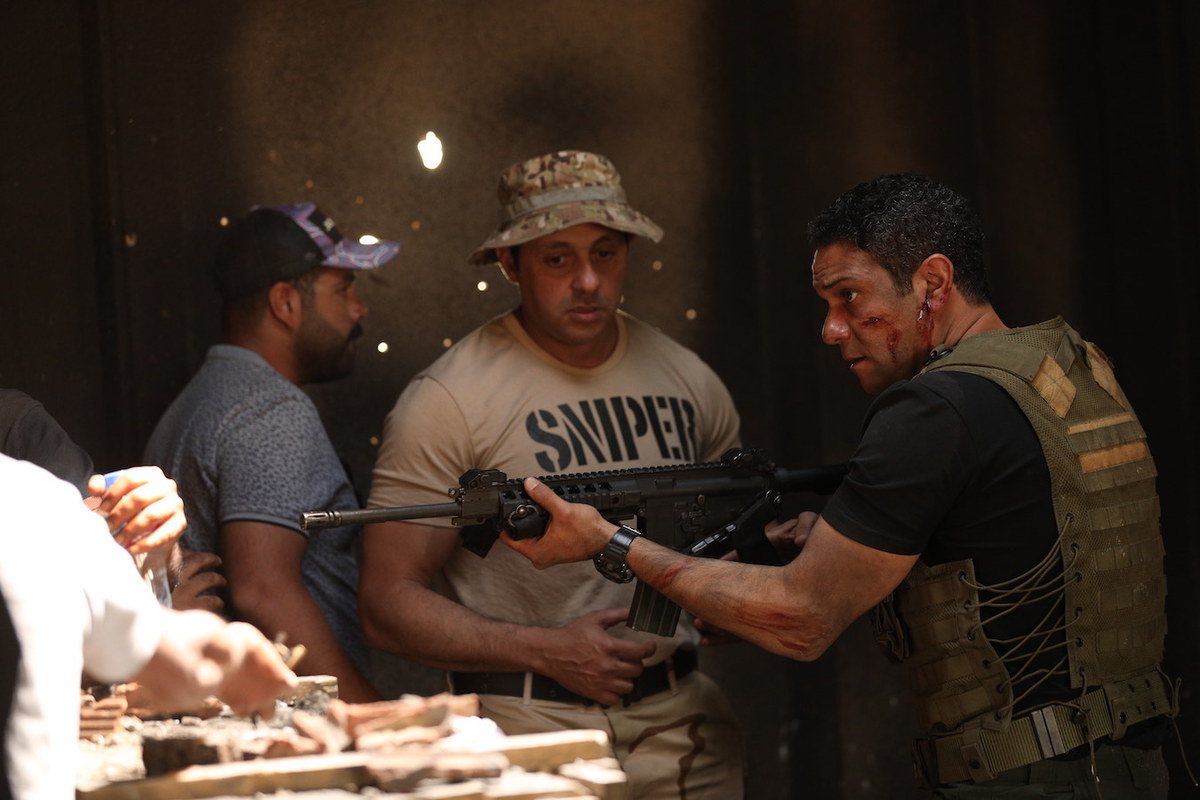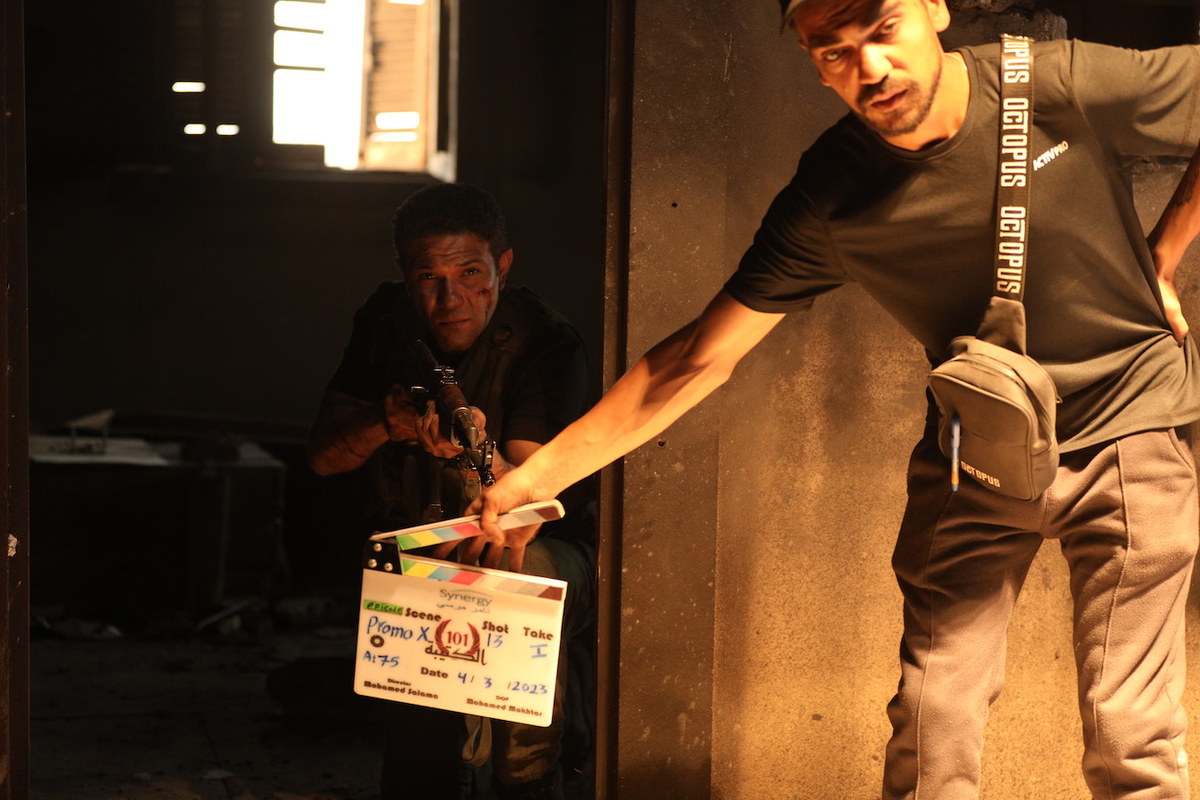DUBAI: Egyptian actor Asser Yassin had heard the stories. For much of the last decade, Wilayat Sinai — a radical terrorist organization aligned with Daesh — had turned Egypt’s Sinai Peninsula into hell on earth for many, as they staged attack after attack, leaving scores dead as the group attempted to reshape the country in their image. The people that stood in their way, and ultimately overcame the threat, were the soldiers of the Egyptian Army’s Battalion 101.
Yassin had heard the stories, but how could he have known how deep their sacrifices went? Their struggles and triumphs remained relegated to news briefs and statistics. No one had really explored what really happened out there.
“Our nation does not realize the sacrifice given in this sector — how much of their own blood they spilled to protect their country. I feel it’s my duty to be a part of telling those stories, so the world knows exactly what happened,” Yassin tells Arab News.

Asser Yassin and Amr Youssef in ‘El Keteeba 101.’ (Supplied)
With “Battalion 101,” airing on MBC Shahid throughout Ramadan, that story will finally be told. For Yassin, who stars as a military intelligence officer tasked with undermining Wilayat Sinai — and procuring the knowledge needed to do it, getting into character first required him to learn the real stories of what happened, the human stories, so that he could give this series his all.
“The thing that has touched me the most while making this show is that, in the intelligence world, you will never hear these stories, because people cannot tell them without risking the lives of others. You cannot say how an intelligence officer died defending his country. His kids may know that he’s a hero, but they can’t put it out to the world because their father died on a secret mission,” says Yassin.
“I met some of the families, and they know the men their fathers were. They know he was their champion. But they can’t tell the media. But I can put those fathers into my character. I can’t say their names, I can’t say the details, but I can put their spirits into this, in appreciation for the people who secretly died fighting these evils,” Yassin continues.

Asser Yassin (R) on the set of ‘El Keteeba 101.’ (Supplied)
While Yassin is an accomplished action star, his character in the series, for the most part, is not on a battlefield dodging bullets, or swinging from helicopters. To better understand the intelligence world, Yassin met with officers to learn about the particulars of things such as interrogation, finding that many of the tropes that are present in most films and television are pure fiction.
“It’s all in the particulars. There’s no fans or distractions in the room, there’s no two-way mirror. The setting is not nearly as dramatic. Usually, the officer, for example, stays sitting behind a desk in a room that’s as basic as can be, with only certain shades of gray because it’s psychologically important,” says Yassin.
After diving headfirst into the details, the challenge for Yassin was to dramatize this world. When there was so much dedication to telling the story as it actually happened, and following the events to the letter in order to properly honor the people that went through those situations, it was important to keep in mind that the show was being made for an audience looking to be entertained, not to be studied as part of a history course.

Asser Yassin (L) prepares to shoot a scene for ‘El Keteeba 101.’ (Supplied)
“We had a responsibility to give a proper image of what we were portraying, of course. There are so many facts for us to deliver, but we couldn’t just be informative, we had to be engaging, we had to also make it an Egyptian drama. That can be a huge challenge,” says Yassin.
Yassin worked closely with the writers and supervisors, including people from the military who were on set as consultants, in order to make sure that the audience was always first and foremost in their minds.
“We would ask ourselves questions like, ‘Can we not talk about that part? Can we make this terminology simpler?’ It could get very heavy if we didn’t. People don’t care about how you build the rocket, they care about whether the rocket is going to fly, and where it’s flying to. When you focus on that, then you have something suitable for people to watch,” he says.
Yassin also did that by focusing on his character Khaled, who, as a composite of the many intelligence officers he learned about, was also ripe for drama.
“Khaled is a guy who manipulates everything with the utmost skill. He gives you the sense that he’s always awake, he’s always around, and he can even be in two places at once,” says Yassin.
“What made him work as a character though, is not the high level of skill he possesses. Yes, he’s always doing his job right — he never makes a mistake. But that doesn’t mean that things will always work out. Sometimes you can do everything right and things still won’t go the way they’re planned, and his frustration in that gap was fascinating to explore,” Yassin continues.
Starring opposite Yassin is Amr Youssef, who became one of Egypt’s biggest stars after his turns in projects such as “Sons of Rizk,” 2015’s “The Prince,” and the highly regarded 2016 Ramadan hit “Grand Hotel.”
“Amr and I have known each other a long time, but we never worked together. It has really been fun, as we have a nice chemistry and we’re really becoming better friends as we work through this challenge together. I can see a lot of collaborations happening in the future, as, even though we’re on similar levels, we’re completely different types, which creates an interesting contrast,” says Yassin.
Everyone involved was interested in telling the story right, which involved breaking with the usual structure of Ramadan series — they avoided stretching it out to the standard 30 episodes, instead keeping it to 20, so the story could be exactly what it needed to be, and no more.
“It’s much better for everyone involved. The quality is better, and you can focus more on production, rather than rushing things out. It’s still tight, but compared to the torture of hitting 30 episodes that will air night after night, the pain is a lot more livable,” says Yassin.
Mainly, though, as Yassin speaks to us from set in the final days of filming, he is most focused on how the real story resonates with audiences now that they can finally learn the truth.
“I hope that people can appreciate the people who died, and the people who are still out there risking their lives. That’s what touches me most about all of this. I’m thinking about the kids of those fathers who are gone now, and I hope people watching at home will think about them too, and how much they gave so that they could watch a series like this comfortably in their homes all these years later.”














